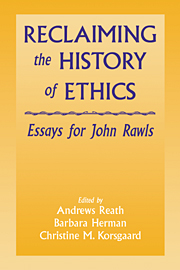Book contents
- Frontmatter
- Contents
- List of Contributors
- Introduction
- Aristotle on the Soul's Conflicts: Toward an Understanding of Virtue Ethics
- Coercion, Ideology, and Education in Hobbes's Leviathan
- The Hobbesian Side of Hume
- The Natural Goodness of Humanity
- Metaphysics, Philosophy: Rousseau on the Problem of Evil
- Within the Limits of Reason
- A Cosmopolitan Kingdom of Ends
- Legislating for a Realm of Ends: The Social Dimension of Autonomy
- Kant on the Objectivity of the Moral Law
- Kantian Virtue: Priggish or Passional?
- Taking the Law into Our Own Hands: Kant on the Right to Revolution
- Kant on Aesthetic and Biological Purposiveness
- Kant on Ends and the Meaning of Life
- Community and Completion
Kant on Aesthetic and Biological Purposiveness
Published online by Cambridge University Press: 04 November 2009
- Frontmatter
- Contents
- List of Contributors
- Introduction
- Aristotle on the Soul's Conflicts: Toward an Understanding of Virtue Ethics
- Coercion, Ideology, and Education in Hobbes's Leviathan
- The Hobbesian Side of Hume
- The Natural Goodness of Humanity
- Metaphysics, Philosophy: Rousseau on the Problem of Evil
- Within the Limits of Reason
- A Cosmopolitan Kingdom of Ends
- Legislating for a Realm of Ends: The Social Dimension of Autonomy
- Kant on the Objectivity of the Moral Law
- Kantian Virtue: Priggish or Passional?
- Taking the Law into Our Own Hands: Kant on the Right to Revolution
- Kant on Aesthetic and Biological Purposiveness
- Kant on Ends and the Meaning of Life
- Community and Completion
Summary
One of the most problematic features of Kant's Critique of Judgment is its apparent lack of unity. Kant announces in the Preface that its topic is the faculty of judgment, which is one of the three higher faculties of the mind. But the two parts of which it is composed appear to have very little connection, either with each other or with the notion of judgment as such. Part One, the Critique of Aesthetic Judgment, is almost exclusively about aesthetics, focussing on the notions of the beautiful and the sublime as they apply to both nature and art. Part Two, the Critique of Teleological Judgment, is mostly about philosophical issues related to biology, dealing primarily with the role of teleology in the organic world. The long introduction preceding the two parts provides only obscure and fleeting hints of the relationship between them. Rather than lending coherence to the work, it increases the appearance of disunity by introducing a third and seemingly independent topic, that of nature's comprehensibility under a system of empirical concepts and laws.
The most inviting prospect for a unified reading of the Critique of Judgment is offered by the notion of purposiveness [Zweckmäßigkeit], which plays a central role in Kant's treatment of each of the main topics with which the Critique of Judgment is concerned. When we characterize living things and their organs in teleological terms, according to Kant, we regard them as purposive. By the same token, we ascribe purposiveness to the natural processes which produce living things and make possible their functioning and further reproduction.
- Type
- Chapter
- Information
- Reclaiming the History of EthicsEssays for John Rawls, pp. 329 - 360Publisher: Cambridge University PressPrint publication year: 1997
- 3
- Cited by



